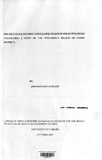| dc.contributor.author | Letoluo, John Leyian | |
| dc.date.accessioned | 2013-05-08T11:20:41Z | |
| dc.date.available | 2013-05-08T11:20:41Z | |
| dc.date.issued | 2003-10 | |
| dc.identifier.citation | Masters of Arts Degree in Development Studies | en |
| dc.identifier.uri | http://erepository.uonbi.ac.ke:8080/xmlui/handle/123456789/20291 | |
| dc.description | A project presented in partial fulfillment of the Master of Arts Degree in Development
Studies,University of Nairobi | en |
| dc.description.abstract | The main purpose of this study was to investigate the influence offarmland leasing on the
livelihood strategies of pastoral households.
The study was conducted in two wheat-growing locations of Narok district. The main
survey involved eighty respondents randomly selectedfrom both administrative locations.
A total of ten key informants were also interviewed.
The study found that pastoral households mainly leased out their land in order to earn
some income. Secondly, many leased out their land due to inability to effectively utilise
their land.
The households were found to have invested their lease income differently. However, the
majority invested most of it in the education of their children. Many had also invested
heavily in livestock.
Farmland leasing was alsofound to have several effects on pastoralism. One major effect
was the reduction in the size of land available for grazing, which has forced pastoralists
to make significant adjustments. It has ~Iso encouraged a seasonal migration of livestock
that is not based on scarcity of pasture due to drought but rather from the alienation of
land by farming.
Most households had also seen e significant increase in the number of their animals
since they started leasing out their land. The whole process of farmland leasing was
found to have especiallyfavoured sheep farming.
It was also established that farmland leasing is likely to continue into the near future.
However, there are some indications that it could come to an end in the distant future as
social and economic changes take place among the pastoralists.
In view of the above findings, some conclusions were made. The increased
commercialisation of the pastoral economy has encouraged households to lease out their
land to tenants. Secondly, lease income has encouraged pastoral households to diversify
into other livelihood activities like business, crop farming and investment in capital
assets. The study also concluded that farmland leasing is intensifying pastoralism by
encouraging some new aspects into traditional pastoralism. Finally, the study concluded
that pastoralists do not really identify withfarmland leasing as a livelihood strategy. The
practice is therefore likely to come to an end sometime in the future. | en |
| dc.language.iso | en | en |
| dc.publisher | University of Nairobi | en |
| dc.title | The influence of farmland leasing on household livelihood strategies: a study of the Wheatbelt region of Narok District. | en |
| dc.type | Thesis | en |
| local.publisher | Department of Arts in Development Studies | en |

